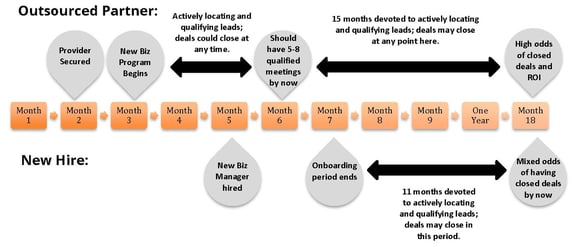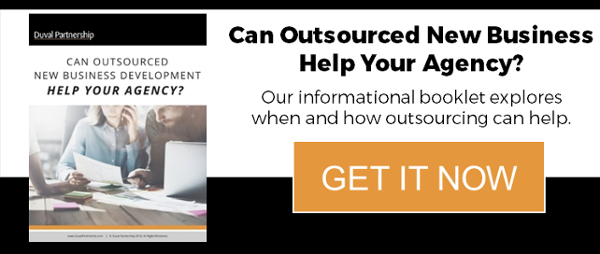
Recently, we developed a paper exploring the question of when, how, and if outsourcing new business can help an agency (you can access it here, no form required). Part of that exploration was trying to quantify in some meaningful way whether it is more beneficial for an agency to hire a new business professional or to collaborate with an external partner on new business development.
Although my firm provides such outsourced services, our exploration is not as biased as it may appear. For one thing, we help on both sides of the equation, as we also consult agencies on how to hire correctly for new business positions. After a hire is made, we provide coaching to keep that new business person on track to bring in leads. Our intent in trying to illuminate the better path was genuine curiosity, and (as one would expect) the answer is not the same for all agencies.
It is well known that new business generation is a huge issue for agencies. Also well known are the challenges around hiring and retaining agency personnel broadly, and agency new business professionals in particular. (We've written an eBook about that too, if you are interested). The reasons why agency new business professionals fail has been explored to some extent, but much of that conversation has been about informal observations, best guesses, and distributing blame. Meanwhile, agencies are stuck on a hiring merry-go-round, constantly replacing people in their new business roles but unable to retain them long enough to see the results they want.
My suspicion (supported by Hubspot's recent Agency Pricing & Financials Report, which revealed most agencies aren't tracking their KPIs) is that many agency owners are just going through familiar motions when it comes to new business hiring, without considering the bigger picture and how each step affects the outcome. After all, if you aren't tracking performance, how can you know the ROI of your new business hiring investment? Let alone what you need to adjust to change the outcome.
Comparing the costs & ROI of hiring to outsourcing
When we compared a projected 18-month window of the path to closed new business generated from a new hire against the path to closed new business via outsourcing, here is what we found:

For most agencies, outsourcing provides greater odds of closed new business. One of the reasons is that it typically takes months to hire someone and get them onboarded. Another reason results lag when agencies hire a new business person is that it is extremely difficult to hire correctly for this position. The odds of hiring the right person are against you, and the odds that your agency has the resources to enable them to succeed in their role are also poor.
We didn't just come to this conclusion entirely based on gut instinct. We looked for existing data to support or disprove patterns we already see in the field. It is certainly imperfect; there is not data to support every aspect of our comparison, and the data we do have is from different sources and not necessarily agency-specific.
Everything on the outsourcing side of our comparison reflects our own experience (versus outsourced new business providers in general), and everything on the hiring side of our comparison assumes an agency is hiring on their own (without the involvement of outsourced support). Still, it is moving in the direction of illuminating time frames, costs, results, and ROI for agencies when they make new business decisions, and we hope to make updates as new data becomes available.
In developing our timeline, we reference the Dice-DCF Vacancy Duration Measure, which found that employers (across industries) typically take 25-58 working days to fill positions, or 5-12 weeks. In 2016, the mean length of vacancies is growing significantly, with the most recent data placing the mean around 29 days.
Filling new business positions is especially difficult, because few have a track record of success and experience with sales and/or new business in an agency environment. If it doesn't take you a while to find a qualified hire for this role, it may mean you aren't doing adequate due diligence.
As for the odds of a new business hire performing, we generally referenced Gallup, which found that "even among the best organizations...it was not unusual to find 35% [of salespeople] consistently in the bottom half of the rankings" for the "talents necessary to be consistently successful in their jobs."
For ROI and costs of hiring, we cite Dr. Brad Smart's Topgrading studies, which peg the average cost of a sales mis-hire at as much as six times their base salary, though we used a more conservative range of three to six times base salary.
We did not cite a specific study on the odds of mis-hiring generally, but there are many out there, of varying quality (Dr. John Sullivan compiled examples of numbers around hiring failures on ERE Media, and Green Job Interview has compiled others). In general, the data show that mis-hiring is a serious and costly problem for employers in all industries. Hubspot has estimated it costs them $84,000 per mis-hire. Mis-hiring for sales roles is even more costly because the hire is supposed to be generating revenue and when they don't perform they lose opportunities, which is exponentially more damaging to your bottom line.
Why your new business hire will likely have poor ROI
Once you make a hire, even if you went through the steps of using an assessment and asking the right questions and checking references, and even if you managed to get the right person for the job, the odds of them performing are still poor. Why?
- Because hiring the best new business rock star won't do anything to address your agency's lack of differentiation and positioning, which (for at least 43% of agencies) probably needs refinement (Hubspot).
- Because you may not even know who your ideal target client is (42% of agencies have no buyer personas established, and not surprisingly, closing rates for agency pitches are a pitiful 9-13%, Hubspot).
- Because you don't have the necessary tools to grow your agency (44% of agencies aren't using a CRM, Hubspot).
- Because you may not even have a formal new business plan in place, nor a repeatable sales process.
- Because you probably don't have a sales onboarding process in place. Proper onboarding is crucial to establish expectations, prepare your new hire, and decrease the overall time to get them performing at full productivity. (If you aren't sure what a sales onboarding process should look like, here is a tool from Process Street you may find helpful. It is meant for startups but still provides a good overview).
- Because you probably don't have someone coaching and managing your new business hire to help them develop their sales skills and stay on track to reach their goals (if they even have clearly defined goals).
- Because you may have a poor grasp on what is going on (only 27% of agencies are even tracking the leads they generate, and only about 50% of agencies track revenue per client, Hubspot).
- Because you likely have unrealistic expectations about when your new hire should be bringing in new business. Calculations for ramp-up time for a new hire vary, but typically include the length of your sales cycle, plus 90 days (to account for a learning curve/onboarding period). New hires with less experience in the agency environment or in sales will require additional months added to their expected ramp-up time.
If you don't know your agency's ramp-up time, you will either not give your new hire adequate time to succeed, or you will not hold them accountable when they should be delivering results. CSO Insights reports the average time for new sales reps to ramp up is 10 months, but it's likely longer for agency sales reps; Act-on has stated the agency new business sales cycle is 18 months to 3 years long in one of their case studies.
We estimated that an agency's total cost of hiring a new business professional over an 18-month period is between $146,000 and $293,000, which includes salary and benefits. We didn't include the internal time and labor costs invested in the hiring and onboarding process. That estimate assumes the new hire is on track to perform. Because a mis-hire is more costly (due to unemployment costs, lost opportunities, and the costs associated with replacement), if your hire turns out to not perform and leaves, we estimated the cost at between $225,000 and $900,000.
We arrived at those figures using a salary range of $75,000 to $150,000, with additional employment and benefit costs conservatively calculated at $22,000 to $45,000 (using the low end of Joe Hadzima's estimated 1.24x to 4x base salary, which is actually a range of $18,000 to $450,000 in additional costs). After combining annual salary and benefits, we multiplied it by 1.5 (years) to arrive at the 18-month cost figures ($146,000 to $293,000). We then multiplied the base salary ranges by three on the low end ($75,000 x 3 = $225,000) and by six on the high end ($150,000 x 6 = $900,000) using 50% and 100% of Brad Smart's estimated potential costs of mis-hiring. Obviously, it is not an exact science and these are only meant to provide some sort of ballpark figures.
With those costs, you would need your new hire to close one or two deals in 18 months, assuming the deals are valued at $200,000 (an arbitrary placeholder), just to have a chance of breaking even.
Why outsourcing offers greater odds of success
On the other hand, while outsourcing new business does not offer guaranteed results (because it is impossible for a partner to control an agency's commitment to the process, actual quality of work, and other factors), and it is not right for every agency, generally we think it offers better odds of success with greater potential ROI.
For example, the time to start actively locating and qualifying leads occurs much earlier in the process; hiring, interviewing, and onboarding are eliminated. The question of whether you have hired someone who is able to perform in your role is eliminated (true, there may be risk associated with whether your outsourced partner will perform, but again, we based our comparison on our own experience and not all outsourced new business providers). Whoever you hire as an outsourced partner, they should be industry experts who have a track record of success bringing in leads for agencies and can help you develop relationships with potential clients that are right for your agency.
In an 18-month window, not only are your odds of closing greater when you outsource your new business, but your costs will likely be significantly lower as well. We estimate a range of $90,000 to $127,500, which is significantly lower than the estimated costs of hiring someone for that length of time ($121,000 to $244,000). You only need to close one deal (at $200,000) to make a profit when outsourcing, and you can expect to retain a greater profit ($72,000 to $110,000, compared to a best-case scenario of $54,000 profit when hiring, in our projection).
Get a copy of our paper to learn more about whether outsourcing can help your agency and see a more detailed side-by-side cost comparison and timeline of hiring vs. outsourcing.
If you enjoyed this post, you also might want to read these:
- Look Beyond a Pitching Frenzy for New Business in 2017
- What Your Agency Needs to Know About Industry Trends in 2017
- Plan Ahead: It's Open Enrollment Period for New Business
This post was originally published on LinkedIn Pulse on November 17th, 2016.
Image credit: ⓒ alessandroguerriero / 123RF Stock Photo; modified by text overlay.



